SOCIAL MEDIA AG ENGINE.
LIVE VIDEO & PODCAST SERIES WITH HEIDI WRIGHT
Heidi Wright chats with highly respected Business Coach, Executive Consultant, Author and Keynote speaker, Steve McLeod about what it takes to move your business from surviving to thriving in unprecedented times.
Heidi Wright:
Okay. So, really great to have you join us. We’ve still got a couple of minutes, Steve. We’ll hang tight until it’s 9:30 kickoff time.
Steven McLeod:
Yeah, cool.
Heidi Wright:
I’ve been paying close attention to your book of late. It’s a beauty. Thanks for sending me a copy.
Steven McLeod:
That’s okay.
Heidi Wright:
I was flicking to the section on marketing. Chapter eight, marketing and sales strategies to dramatically grow your business. The quote here from Peter Drucker, “Business is only two basic functions: Marketing and innovation.” I find what we’re facing now with these unprecedented times, how important is innovation?
Steven McLeod:
I think the key there is, to ask ourselves, is our sales plan focused around new customers or existing customers? And then new products or existing products? I find a lot of businesses always talking about this blue sky, let’s go and invent a new product to a market we’ve never serviced. Whereas most of the time they’re actually missing the basics which is what do my existing customers I’ve worked with actually need?
I just feel that a lot of the businesses that I’ve worked with that are able to really grow and grow quickly, rather than just going and always finding something new, they’ve actually looked at their existing customers and said, “You know what? What do they need at the moment? What are our key competencies and skills? And then, how do we really help them?” Particularly in times like this. I think something like that’s actually really critical, whereas going and finding new customers in current market, depending on what industry you’re in, but it’s actually harder now than it was before.
Steven McLeod:
It’s harder to get the cut through if you’re trying to sell to other businesses that are in times of crisis. I mean, if you are getting new leads and new opportunities and prospective clients come through now, they’re probably more qualified than ever before, because they’re actually coming to us in this difficult time. If they’re coming to you now about opportunities, I’d take that as a really hot type of lead and opportunity and really try and do the best that I could to convert it, to help them and see what they needed.
I always like to think it’s really hard to do both new customer and new product at once. But if you’re able to say which of those do I want to concentrate on? Then just have one new, like existing customer and then launch a new product to help them, then that’s much easier and that’s less risk.
Heidi Wright:
Yeah, and that makes total sense. And you’ve already got that relationship, you’ve already spent the money in acquiring that customer so it makes sense to double down on that. I think talking to our customers, too, and just finding out where they’re at in all of this. Things are changing for them, things are changing for you, as the service provider or slash, product marketer. So, it could be new opportunities that are coming out of that, and keeping that communication up is important.
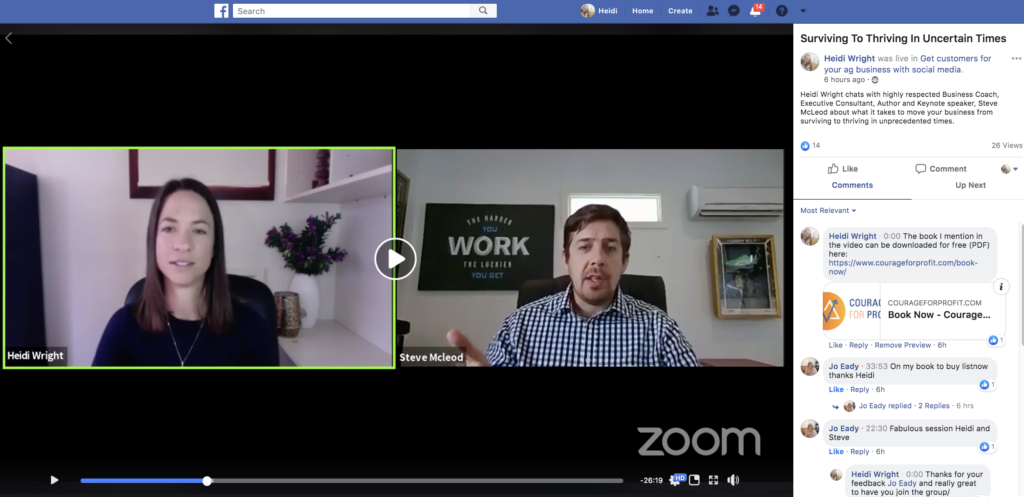
Watch the replay at https://bit.ly/FreeGroupForAg
Steven McLeod:
Yeah, agree. And I think it’s more important than ever to actually be really understanding what’s happening with our existing customers. Because I also think that if we’re actually staying close to our existing customers now, then there’s a potential that they’re actually going to come through the end of this and go, “You know what? You weren’t there for me when we needed you. You didn’t check in on us, you didn’t help us, you didn’t offer us anything” and that’ll be a good excuse for people to go and move on.
Steven McLeod:
I actually think we can never really go wrong by staying close to our existing customers, and understanding what they need, and asking what are their challenges or how can we help them as well? And that might not mean necessarily an extra sale, but actually just helping people through their difficult times. I’ve got a lot of success with client businesses lately who are in very difficult and hard hit industries, like I’ve got events business, a wedding business, these type of businesses and a very large chain of pilates studios that I work with, and all of them are completely closed.
Steven McLeod:
I mean, first of all, yeah, they’ve got to look at how to pivot their product or service, but a lot of them are offering something for free, something of value. Might be a free pilates session once a week to people who have been in their network, or it might be a free live entertainment stream DJ or band or something, but something to try and engage with people, but otherwise they’re doing it tough as well.
Heidi Wright:
Yes. Well, I’m excited about this chat because we’ve already covered a few bits and pieces here. So, let’s get into it. It’s 9:30, and for those of you who don’t know Steve, Steve is very sought after business coach. He’s also a trainer. His background, he used to be a firefighter, so he’s used to operating in high pressure scenarios. He has written this book, Courage for Profit, which I personally highly recommend.
Heidi Wright:
And he was a keynote speaker at the Digital Marketing Conference earlier this year, one of the last events I went to after the Wimmera Field Days, when the general public were able to be face-to-face!
Steve’s specialty is really bringing businesses between the one million and $150 million size, empowering them with growth strategies, which is exciting for the I guess theme we’re in today Steve, because you’ve worked with a lot of businesses, both big, both small, across a range of industries and you’ve helped some of them move from that survival space into that headspace of thriving.
Heidi Wright:
Now, for the ag industry, a lot of people here in this group, some of them are business owners, some of them are ag professionals, and they probably range in that bracket as well. There’s been minimal impact on some of those, but others are in survival mode, and they are doing it tough. A good opening question is, for those who are in survival mode, how do we move into a more productive space that’s actually going to position our business in a better position coming out of this?
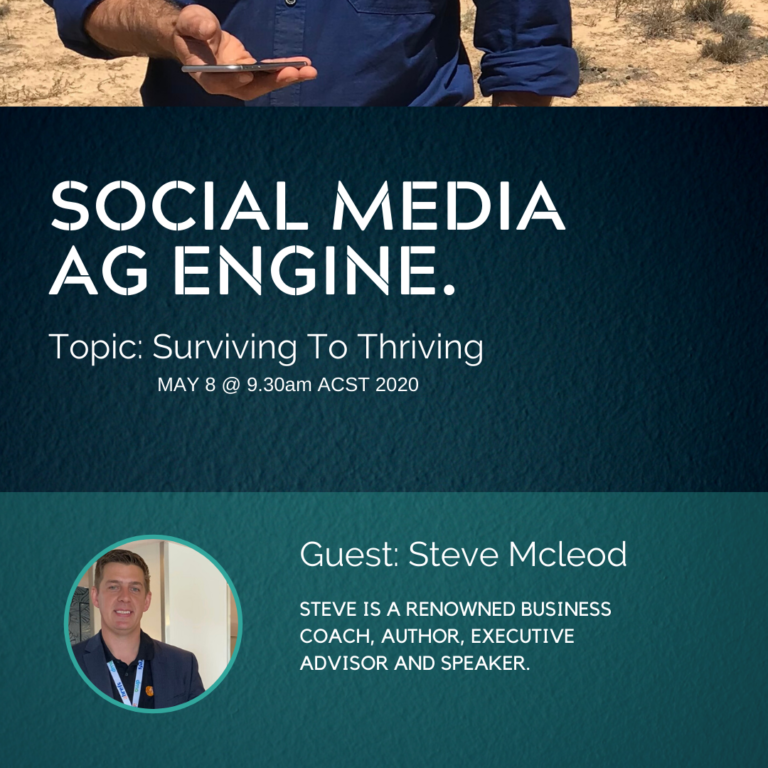
Steven McLeod:
I think businesses in survival mode, and look, I mean, I still work with about 20 businesses in that range today, and spent the last eight weeks with probably 70% of the business I work with going through really difficult times, and that survival mode, and then 30% probably that are stronger now than before.
Steven McLeod:
So, I think the first thing there is in the survival mode, they’ve just got to have their business model where they’re breaking even or better. They might not have to make as much profit as what they had before, but they’ve got to get their costs right, they’ve got to look at what customer segments … Like, what are the sectors that are doing well that they’re selling to? If they look across 10 different customers, what are the products or what are the customers that are doing well, and how can we try and support them more?
Steven McLeod:
Once we’ve got to the staff, the cost, we’ve got all of that sort of stuff a bit more stable, we’ve got to be really looking at our existing customers and our existing products and saying, “Where are the opportunities?” To me, I always love like I was saying before, starting with existing customers. Out of who we’re currently working with, what are the opportunities for some of them that are in good sectors?
Steven McLeod:
It might be that there is a specific customer or specific sector of customer that is actually doing well. How do we stay closer to them and look for the opportunities? Or it might be a specific product that we’ve got. We might have a range of 100 different agricultural products. What’s the one or two that are best? Because maybe our customers are limiting us. Maybe they’re in different channels.
Steven McLeod:
For example, I’ve got some businesses, like I work with a coffee business, a seafood business, and a few others, and they’ve done okay, but they’ve actually changed their channels a bit. For example, there’s a huge trend towards home delivery at the moment. Enormous trend. They’ve looked at doing joint venture deals. I’ve got one that would sell a coffee mix and so they’ve gone out to distilleries to try and do a cocktail takeaway type of offer. I think we’ve got to just really think about who’s buying within our existing customers, or within segments that can buy our product, and how do we have good outreach to them?
Steven McLeod:
Because people are still buying now, and they’re the businesses that have exploded overnight, they actually need solutions really, really quickly. But they might not always see that opportunity themselves. We’ve got to be out there proactively and saying, “Is there an opportunity for us to partner together?” Or, I’ve had a lot of success with businesses in this last sort of six or eight weeks that have even offered product on trial. “You know what? I realize that you’ve got a home distribution channel. I realize that you’re a bit worried about whether this will sell, so you know what? I’m going to give you a pallet of stock and you can sell it, and you know what? If it sells, great, let’s continue and let’s do something, but if it doesn’t, hey, you’ve been able to give something of value to your customers.” It’s just trying to get that foot in the door.
Heidi Wright:
Yeah, I love that. It’s really unlocking a lot of value to your current customer there and showing them what’s possible. I’m, well working with a business at the moment, they’re very innovative business, Meat at the Mount, for those who want to go check it out. They’re a local company here and mostly a butcher shop and well known in their local area and they’ve really jumped into action and developed a home delivery service. They’re doing free delivery for the month of May, which is awesome.
Heidi Wright:
So now families who are short cashed, who still want fresh, organic, nutritious meat from local farms can access that. That’s the perfect example, as you said, of moving with your customer and positioning yourself in a way that actually can help grow and diversify your business.
Steven McLeod:
Agree, and look some businesses have no choice but to do that, to survive. A lot of hospitality type of businesses. If they didn’t change their business model out of night, they’re out of business. Whereas I think now a lot of us that have got businesses that might have been affected a little bit or that have been affected a lot, we’ve got to start thinking about okay, let’s move out of that survival mode where we thinking about every dollar and now where are the opportunities?
Steven McLeod:
Most of the businesses that I’ve worked with, besides the ones that completely had to close because of government restrictions, but where demand has gone back 10, 30, 50%, I’m actually encouraging them now to start spending money in marketing. The reason for that is that a lot of the other customers right now, or a lot of other people, competitors, they’ve just closed up, they’re not spending any money whatsoever. Whereas, I think there are more eyes on things like Google and social media and that than ever before, so now’s a good opportunity for us to go and trial some of those things.
Steven McLeod:
It might be a delivery model or it might be a partnership with other channels, or a subscription model, but just firing a couple of bullets and trying a couple of new things.
Heidi Wright:
Yeah, agree. Have you seen in businesses you’ve dealt with, a bit of a pivot to social media and the online space? Has that been a big play in their marketing plans?
Steven McLeod:
Yeah, look, definitely. I mean, again, depending on the type of business. I mean, I’ve got some business I work with that basically were completely shut due to the government restrictions around gyms and things like that. So, we always had a plan that we would do something online whereas now, I mean that’s the only revenue coming in for some of these businesses. We had to get something set up overnight, so some of them it might be a live Zoom type of training like this with a personal training workout, or it might be something pre-recorded.
Steven McLeod:
Generally what they’re trying to do is to give something away of value for free to start. So to actually say, “Look, why don’t you come and do this as a trial? Then if you like it, this is how we’ll be able to go forth.” Yeah, look, I think people there are spending a lot more … I mean, there’s stats around there’s somewhere between 30 and 40% more usage time on social media, particularly in capital cities at the moment.
Steven McLeod:
I think across the country, it’s generally costing half as much to be in front of 1000 people. Saying that, the cut through is still hard. You’ve still got to make sure that you have a good call to action or a good lead magnet, something that’s actually going to get people interested. But I think particularly in the food space, we should be right now being really aggressive. I’ve got a couple of customers in that space as well, and one of them last week, we said we’d double our marketing budget for the next three months, just to really say, “You know what? Now is the opportunity for us to actually try and step change what we’re doing in the business and get our brand out in front of a lot more people at a lower cost than usual.”
Steven McLeod:
We’ll do it and we’ll test it, and if it’s not good in a month’s time, then we’ll bring it straight back but it’s just a good opportunity for us to try and test that now.
Heidi Wright:
Yeah. Absolutely. That trend, in terms of Facebook and Instagram advertising, that trend is across the board. Travel and tourism. They’ve completely dropped out, the real estate has freed up, and it just drives the cost of advertising down. For those people already making a positive return on investment, they’d nearly be in a … I don’t want to use the word silly. I can’t find a better term. Not to ramp up their advertising if they’re already getting that positive return on investment, and for those businesses I guess that are sort of sitting on the fence, they know opportunity is there, not sure about how much to spend, well this is a good opportunity to test some things out.
Steven McLeod:
Yeah, test it out. I had a business that I worked with that we decided just to double it for a week and we’d look at our return on ad spend and click-through rates and other things. The other thing would be like a retargeting strategy, because if you’ve got people at your website now, if you’ve got people interested now, then again, I think that’s a really good, hot opportunity now. That could be a good example where we can increase our brand presence through some retargeting or something like that as well.
Heidi Wright:
Yes, absolutely. Absolutely. Love it. Okay. Let’s look at what mistakes, businesses are making in their sales and marketing. Like, what are maybe some businesses getting wrong that we can understand so I we don’t fall into that trap?
Steven McLeod:
Look, it depends on whether in survival mode or whether they’re doing okay. I think if they’re in survival mode, it would be not actually looking … I mean, we should have always done this as businesses, but not actually looking at the return of different things we’re doing. For example, right now might not be the time to go and sponsor a local football club or something like that.
Steven McLeod:
Coming out of this, I think it will be, but maybe right now that might not be the best return. But if we’ve got businesses that are doing well, it would be they treat marketing and sales like an expense, and I’m more than happy to reduce any marketing or sales cost that isn’t performing, but I also think that if we don’t have sales, we don’t have a business. Right now, if there are people actually looking for what we’re selling, we should be taking advantage of that.
Steven McLeod:
I have seen, a few of the businesses I’ve worked with, their conversion rate has actually increased. Because the people coming through to an inquiry or to a lead or demonstration, they’re actually more qualified because people aren’t looking to spend money right now unless it’s something that they need. I think that if we’ve got people that we can attract through to us through good marketing or reaching out to our existing clients and they’re coming to us, well then I think it’s a bigger opportunity than ever.
Steven McLeod:
So, I think the mistakes to me would be cutting back without a reason to cut back. I mean, if we have a campaign or something that’s not performing, absolutely, we should be cutting it back or changing it, but if we’ve got something that’s doing well, we should be testing now with some increases in spend or decreases in spend a little bit, and looking at what happens.
Steven McLeod:
I think the other mistake is that some businesses, and look, I understand this completely, but the businesses that might be struggling a bit more, they’ve got all their focus internally, which is on staff, on production, and on the business. Look, I understand that because you have to actually go internal first at the moment, to make sure you’ve got things fixed and working. But we also have to be proactive about customers. Now’s not the time to not be talking to our customers.
Steven McLeod:
I don’t want you to harass them and stalk them, but I want you to check in and say, “Look, how are you going? Is there anything I can do to help?” Again, I’ve had a lot of businesses I’ve worked with that have provided extra product for free, or they’ve gone and helped businesses, and clients that are struggling, knowing that if you can help someone in difficult times, they should remember you forever. Whereas, if you’re not there for them and you don’t reach out to them and you’re not speaking to them, there’s a chance you’re going to go, “You know what? You never really gave a crap about me anyway,” so they’re going to look to leave later.
Steven McLeod:
I just think you’ve got to be in front of them, and looking for helping them. Not necessarily making the sale, but what do you need?
Heidi Wright:
Yes, and I think it’s that word, “help”. I think some of us can be hesitant to actually go and sell during this period, at risk of being seen to be profiteering or going, “Hey, buy from me because I’ve got a solution.” When in actual fact, if you’ve got a solution that can genuinely help solve a problem, you’re doing the customer a disservice and your own business a disservice not to go out and position yourself in a way where they can number one, recognize that A, “We do have a problem,” and B, “Oh, this person can actually help me.”
Heidi Wright:
I guess those people in that fear mentality or uncertainty of going, “Oh, do I have something that the market needs and how do I really sell myself?” What’s a bit of advice around the positioning strategy for … Because I find, Steve, once you know what solution you have, once you understand your ideal customer, you can actually craft a positioning strategy that you’re so comfortable with that it’s natural to sell, to provide that message. For those people struggling I guess to understand what their unique selling proposition is, what advice maybe could you give?
Steven McLeod:
Well, I think the first piece I would say there is why are we actually passionate about what we do? Most business owners that I meet, particularly your type of clients, they’re doing it because it’s something they’re passionate about, or something that’s been in their generation for a long time, or their families. The first thing would be connect with why do we do what we do?
Steven McLeod:
I like the idea of that, because the businesses that you work with are actually there helping people, whether it’s whether agricultural supplies or whether it’s with food or all sorts of other things. Like, without them, a lot of people are in trouble. Connecting with our passion, saying, “Why do we do what we do? How are we helping people?” I think the only thing I don’t like in terms of sales at the moment is where people try and take advantage of people.
Steven McLeod:
When people go and overcharge, they do the wrong thing and they rip people off. I’ve got not tolerance for that and those businesses will die a death after this. But businesses which are there saying, “Look, this is what we can provide. Are there opportunities for us to work together? How can I help you in your business?” Or, “Do you have more of a demand for this other product?” Even asking something like, “Look, how’s your business going? Because I want to make sure I’ve got enough product to be able to supply your business.”
Steven McLeod:
Particularly during a couple of weeks ago, there was a huge lack of supply available in the market across a lot of different products, as people went and bought like crazy. Actually asking and saying, “What do you need from us? What’s your next two weeks or four weeks look like in terms of the supply that you require?” But if you just do it from a position which is, “Hey, how are you going and how’s your business managing?” Actually be able to reach out like that.
Steven McLeod:
If I look at my fire and safety business, I reckon out of all of our suppliers, probably only two actually reached out to say, “Hey, how are you going? Is there anything we can do to help?” Those two we won’t forget, but the rest of them that weren’t doing that and weren’t trying to do the right thing, they’re probably the ones that will go through a difficult process with us after all of this finishes. Because they didn’t try and help us, they didn’t do anything. They just basically left us alone, whereas I think doing something at a nice proactive strategy, which is, “What can I help you with?”
Steven McLeod:
I’ll give you an example on this. I have a business called Sketch & Etch that I work with. They do wedding signage and a whole lot of wedding products for couples. Now, the wedding industry has been extremely badly hit as a result of all of this, with weddings postponed or canceled. What they said across all their social channels is, “Look, we know you’re going through a difficult time. We’re going through a difficult time as well, but we’re going to do something special for all the couples who had to postpone their wedding.”
Steven McLeod:
They basically said, “You know what? If you know anyone that’s postponed their wedding, or if you have, we’re going to send them a gift.” They literally spent a little bit of money and they had a registration, I think 600 odd people were registered, and it was picked up by a couple of newspapers. They did it just saying, “Look, you know what? This is something to get through this period” and no sales, no marketing, anything. It was literally something to try and help people and the results from that were huge, because people who were devastated about canceling their wedding now have actually got something really nice.
Steven McLeod:
I think something like that, even a situation where people aren’t buying, can build long term brand strength that people won’t forget that.
Heidi Wright:
Yeah, fantastic. That’s a really good example. Really good example. I’m just jumping over to the Facebook group. We have James here join us, and Georgia, and I’ll just double check on questions. I’ve been working on my payment terms with my long term clients which has been well received. Oh, that must have been a comment earlier on. I need to train up with looking at the comments and also engaging in conversation.
Steven McLeod:
That’s all right.
Heidi Wright:
Guys, if you are live with us, feel free to ask a question. We have Steve for another 10 minutes, so if there are any questions around what we’re discussing, sales and marketing, leave it in the comments and we’ll answer it.
Steven McLeod:
Let me give a couple of thoughts, just around cash flow and whilst you look at those questions.
Heidi Wright:
Sure.
Steven McLeod:
One of the thoughts is that a lot of businesses are going through difficult times as well, and I think we need to be understanding on both sides. Both with the suppliers we work with, but also with customers. Because examples where businesses right now that are struggling, and just going, chase them really hard around money without actually talking to them, I think is really going to cause some long term damage.
Steven McLeod:
I completely understand the importance of getting paid on time but I also think we need to be flexible and say, “Look, how’s your business going? If you can’t pay today, let’s arrange a payment plan. Let’s arrange something that works for both of us to try and get through this difficult period.” If everyone was that reasonable, I think everything will work out fine, and everyone should get paid.
Steven McLeod:
It’s where people don’t return calls or where people aren’t cooperative, or where people are really hard around it, I just think that there are risks around not just brand damage, but I actually think it’s not a partnership mentality. You should be able to say to a supplier, or to a client, “Look, let’s arrange something that works for both of us because everyone’s feeling that pinch at the moment.”
Steven McLeod:
The other piece around that is just understanding what’s our current cash position? What’s our forecast look like? Because if we’re doing worst than expected, what does that look like over the next 90 days? If we’re doing better than expected, are there opportunities there where we could take some of that money and have a bet? I work with another business that’s doing quite well at the moment and they’re sort of 30% up on where they expected to be.
Steven McLeod:
They’re quite profitable over the next couple of months, so as an example of that, they’re using some of that money to invest in some new equipment, but they’re also using that to be able to probe their marketing and probe their sales. If we are doing better, think about how can we try and leverage that to build long term value?
Heidi Wright:
Yeah, awesome. That’s great. Let’s use that discussion and maybe move into how can we prepare for the unexpected next time? Not saying that COVID will happen or anything to this degree, but there’s always going to be challenges in business and I think more than ever, this has really highlighted the need for us to have a crisis management plan. One that considers our staff, considers our finances, considers our cash flow reserves, considers our stakeholder, supply chain, our customers. What are your thoughts on I guess those that don’t have a crisis management plan? How can businesses get started? What are some of the steps that we can take, learning from this experience?
Steven McLeod:
Yeah, and I think look, even businesses that have those types of plans, I mean, something like this where forcibly shutting a whole lot of things, people are forced to stay at home, I think most businesses wouldn’t have had something to this level. Look, I think a couple of thoughts. My first thought around that always goes to how do we ensure the safety of our staff and customers? Which is how do we make sure we’ve got the right health and safety plans, just making sure that our team members know that we’re going to help them with whatever’s happening. I think that’s always number one.
Steven McLeod:
The second to me is actually understanding different financial models. One of the things that I’ve done day one, when all of this started to happen across a lot of businesses, including my own, and we were quite … We’ve got 140 odd people so we get hit by these sort of things as well, is to actually understand what are the scenarios? For example, if a normal month is 100%, what happens if we’re at 90% of revenue, or 80% or 70%, or if we’re at 110%, 120%? Actually understanding what are the impacts on the business?
Steven McLeod:
Because I like business owners understanding what’s their actual breakeven. I know in seasonal industries, that can be different different times of year, and the more seasonal, the more of a cash buffer we should have. Understanding for example, how long can my business be sustainable if we’re at 60% of revenue? And what would that look like? Or, if we were at 130% because sales have gotten better, what would that mean? How would I be able to fund it?
Steven McLeod:
I think scenario modeling like that that says, “What are my fixed costs? What are my variable or cost of goods sold?” And understanding maybe a 20 or 30% swing. It would have said that in my business, a 30% swing in the space of two weeks, I would have said, “That can’t happen.” This shows that it can. The examples there would be if we’re an industry that we were concerned about changing either up or down, how can we have more variable costs rather than fixed costs? I think that would be one of the big ones.
Steven McLeod:
And also what sort of supplier engagement and things do we have, where we’re actually able to work with them and partner with them around them either scaling up to help us, we’re in good times, or actually being able to scale down if we’re in difficult times.
Heidi Wright:
Yes, brilliant. Brilliant.
Steven McLeod:
Around cash buffers, it’s really difficult, though. I mean, depending on the size of the business, because businesses get really large. It’s actually really hard to have six months worth of cash flow or something like that in the bank. Particularly as payrolls and things like that get much bigger, but most people talk about three months.
Steven McLeod:
If you can have three months worth of operating expenses, which is generally like staff, leasing, things like that, what would it cost to run the business? Most people say that’s good. And more seasonal businesses they might say a bit bigger. But a lot of tech businesses that I’ve worked with will have a year, just because they’re actually, it takes them longer.
Steven McLeod:
Also, don’t stress if you don’t. I’ve got lots of businesses that will be one month, but maybe they have an overdraft or a banking facility with another month. But it depends. More seasonal businesses need a bit more, but it is difficult and I have no doubt businesses after this will stack away more cash than what they did pre all of this.
Heidi Wright:
Yeah. I think you’re right. I think when it comes to assessing our businesses in a sensible manner, it really is about looking at the figures and understanding them, so you can make those decisions when the time comes, rather than getting in a panic mode. Definitely what I’ve seen during this challenging period is there’s some people that have absolutely just freezed up and retreated into fear, and then there’s other people that have jumped into action, they’ve innovated, they’ve made the tough decisions, they’ve had the courage, as you use that word often, to actually take action.
Heidi Wright:
I think even if we are not in that thriving mode, for some of us, there’s a huge opportunity to learn so next time we’re challenged, we actually have the tools to be able to combat that and get out of that, through that, in a stronger way.
Steven McLeod:
I agree. I feel that like the businesses that were going through really difficult times and won’t survive are the ones that just put their head in the sand and do nothing. Just thinking, “You know what? The government will bail me out or something will happen,” right? I think that’s a really dangerous way to run a business. I talk about that courage a lot obviously, and I have for many years around businesses but you’ve got to have the courage to make difficult decisions. I mean, no one wants to put people out of work, no one wants to stop partnerships or agreements with people they’ve worked with.
Steven McLeod:
It’s really difficult stuff, but I also know that if you don’t do those things, and the business doesn’t survive, then you can’t help anyone. I’ve always looked at that from my fire brigade background, in the triage principle, right? Which is greatest good, greatest number. You can’t always help everyone or save everyone, but you can do the best you can for as many people as you can. There are businesses that have gone through really difficult situations, I remember the weekend in Melbourne after when the Grand Prix was canceled. A whole lot of major events and other things, that’s when things got real.
Steven McLeod:
Certainly in Victoria, and a lot of the rest of the country, and then that Sunday night a lot of things started to change. That’s the time where businesses have to be going back and saying, “Okay, forecasting six months is impossible. What does the next 30 days look like? What do I have to do in terms of expenses and customers to make sure we can work our way through it?”
Heidi Wright:
Yep. Well Steve, we’ve got a couple more minutes here. We will finish off with a final question. If you could start over again in your own business, what advice would you give when it comes to leveraging social media? Because there’s a learning journey that’s involved with social media, and we don’t know what we know now back then, you know? What’s your take on that to steer it back to the social media side a little bit?
Steven McLeod:
Look, I think it depends on I mean, what’s the purpose? I think with any type of marketing or activity, you’ve got to go, “What’s the purpose? Is my purpose to get online sales?” Which might be actually getting people to engage with you and click and buy, or is the purpose to build brand or brand equity, or is it to find potential employees? What’s actually the purpose? I find that a lot of businesses, particularly in the business-to-business, they’re not selling to a consumer, they get confused and what’s the purpose of what they’re trying to build?
Steven McLeod:
I think once you’ve got the purpose there, then making sure that the content that you have there is really critical. If I look at the businesses that I’ve worked with that have done exceptionally well, I’ve got some of the really large businesses, consumer businesses that spend millions of dollars a year through social. They leverage video really well as a starting point. It’s not just text and images, but it’s actually video. I mean, it’s behind the scenes. It’s talking about what they’re doing, what a day in the life is, how they work with their customers.
Steven McLeod:
But it’s actually going, “Well, how do we build a really solid following?” Then a second part would be how do you use that following and then also build an offline list? How do you use social media to make sure, “Yep, I’ve got a good following there, but I’m also able to get email addresses or people’s details so I can do that directly, so that should things get more expensive in the future, or should there be something that changes, I’ve got that asset that I’ve worked over that period of time as well.” That might be via free content, or by having a demonstration or sending something for free.
Steven McLeod:
I’ve got a lot of businesses that use a freemium type of … Like a free plus postage type of good lead magnet to get people interested, but just thinking about those sort of things would be something that I think would really help.
Heidi Wright:
Yeah, that’s excellent. I always say, I think this came from someone else, but I always remember this catchphrase and I share it with my clients is, “Don’t build your castle on borrowed real estate. We don’t own social media so don’t build your castle on there.” Use it to connect with customers to engage. Yes, we will convert some of them directly, but really understand that your biggest business asset is that email list. It’s that direct contact information.
Steven McLeod:
Agree. Using it via then emails or text messages if it’s business-to-consumer, like you’ve then got that, so that cost of getting that customer, you’ve then paid it once and you can continue to use it. I think it’s really powerful when used well, but I think a lot of businesses just go and put out a lot of content without understanding why they’re actually doing it. I think yeah, getting back to those basics and then working out what content can I give to people that will help them?
Steven McLeod:
I did a lot of content myself to help businesses in the early days. I offer my book for free to people. Just different things trying to actually help people in the difficult circumstances as well.
Heidi Wright:
Thank you so much, Steve. We’re at 10:00, so we’ve done well I think to keep within the 30 minutes. I can’t thank you enough. Now, I can’t help but share your book again, because I’ve found it to be really great. There’s some very simple and also more comprehensive strategies around growing your business and I know Steve isn’t about selling his book, he’s about helping people. But this is coming from me who’s read the book and met Steve personally. Steve, if people want to learn more about this book, what I might do is I’ll put a link in the comments and people can head over and check it out.
Steven McLeod:
Yeah, sure. Look, it’s there, I’ve got it as a download on my website, CourageForProfit.com. I’ve given it out to everyone for free over this period anyway. If there’s something there of value that helps people, then that’s great, and hopefully every business can get through this in a positive position and knowing that there’ll be great opportunities on the other side of what we’re going through at the moment.
Heidi Wright:
Fantastic. All right. Well, thank you, Steve. We’ll catch up with you soon I’m sure.
Steven McLeod:
Thanks Heidi. Thanks everyone.
Heidi Wright:
Bye.
Steven McLeod:
See you.
Join the free group for ag- related businesses & professionals to learn and share social media marketing tactics: https://bit.ly/FreeGroupForAg
The book Heidi mentions in the video, Courage For Profit can be downloaded for free (PDF) here: http://courageforprofit.com


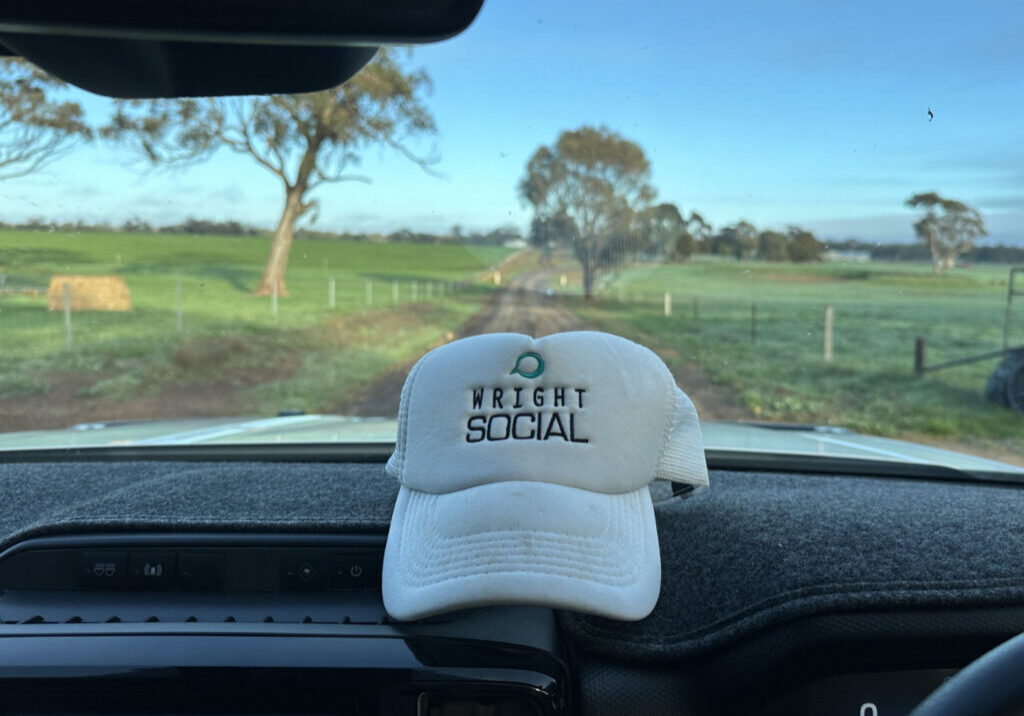
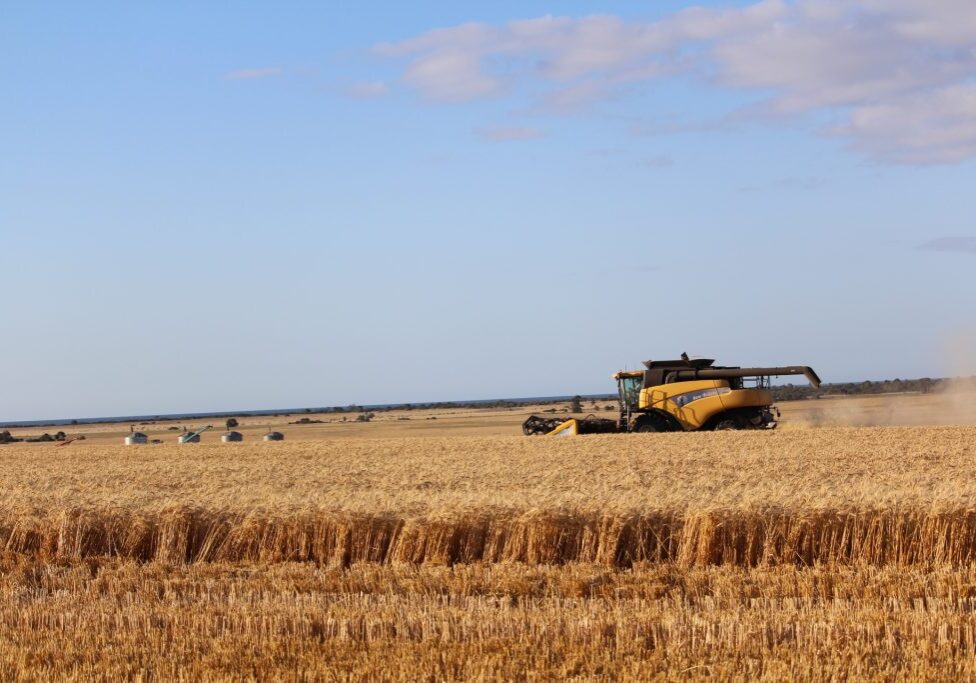
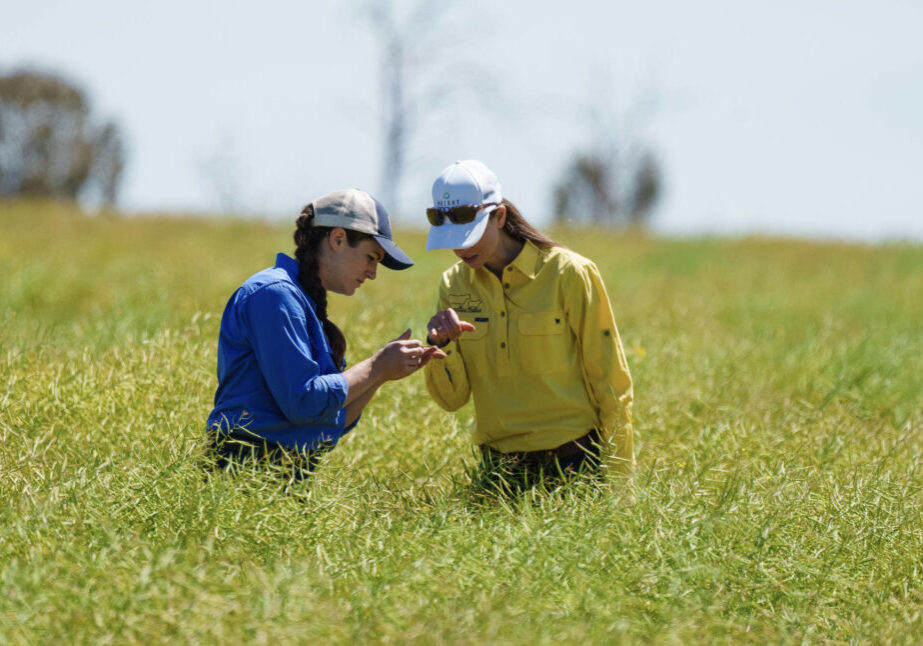
Leave a Reply